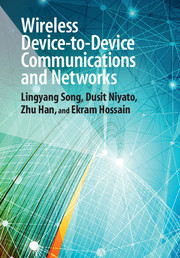Description
Wireless Device-to-Device Communications and Networks
Authors: Song Lingyang, Niyato Dusit, Han Zhu, Hossain Ekram
Enables engineers and researchers to understand the fundamentals and applications of device-to-device communications and its optimization in wireless networking.
Language: English
Subject for Wireless Device-to-Device Communications and Networks:
Approximative price 89.57 €
In Print (Delivery period: 14 days).
Add to cart
Publication date: 03-2015
431 p. · 17.9x25.3 cm · Hardback
431 p. · 17.9x25.3 cm · Hardback
Description
/li>Contents
/li>Biography
/li>
Covering the fundamental theory together with the state of the art in research and development, this practical guide provides the techniques needed to design, analyze, and optimize device-to-device (D2D) communications in wireless networking. With an ever-increasing demand for higher data rate wireless access, D2D communication is set to become a key feature supported by next generation cellular networks. This book introduces D2D-based wireless communications from the physical, MAC, network, and application layer perspectives, providing all the key background information before moving on to discuss real-world applications as well as potential future developments. Key topics are discussed in detail, such as dynamic resource sharing (for example of spectrum and power) between cellular and ad hoc D2D communications to accommodate larger volumes of traffic and provide better service to users. Readers will understand the practical challenges of resource management, optimization, security, standardization, and network topology, and learn how the design principles are applied in practice.
Part I. Introduction: 1. Basics of D2D communications; Part II. Techniques for Modeling and Analysis of D2D Communications: 2. Optimization; 3. Game theory; Part III. Resource Management, Cross-Layer Design, and Security for D2D Communications: 4. Mode selection and resource allocation for D2D communications under-laying cellular networks; 5. Interference coordination for D2D communications; 6. Subchannel allocation and time-domain scheduling for D2D communications; 7. Cross-layer design for D2D communications; 8. Security for D2D communications; Part IV. Applications of D2D Communications: 9. Vehicular ad-hoc networks; 10. Mobile social networks; 11. Machine-to-machine (M2M) communications; Part V. Standardization of D2D Communications: 12. Network-controlled D2D over LTE/LTE-Advanced; References.
Lingyang Song is a Professor in the School of Electrical Engineering and Computer Science at Peking University, Beijing, China. He received several best paper awards at the IEEE International Conferences, and won the 2012 IEEE Communications Society Asia Pacific Young Researcher Award and the 2012 NSFC Outstanding Young Investigator Award. His main research interests include cooperative and cognitive communications, physical layer security, smart grids and mobile social networks.
Dusit Niyato is an Associate Professor in the School of Computer Engineering at the Nanyang Technological University (NTU), Singapore. He has won international awards including the IEEE Communications Society Asia Pacific Young Researcher Award and the 2011 IEEE Communications Society Fred W. Ellersick Prize. He works in various research areas including cognitive radio, mobile cloud computing, machine-to-machine communications, performance analysis, and optimization of wireless networks.
Zhu Han is an Associate Professor in the Electrical and Computer Engineering Department at the University of Houston, Texas. He received an NSF CAREER award in 2010 and the IEEE Fred W. Ellersick Prize in 2011, and he is a Fellow of the IEEE since 2014. He co-authored papers that won several best paper awards at the IEEE International Conferences. His current research interests include wireless networking, security, big data analysis and smart grid.
Ekram Hossain is a Professor in the Department of Electrical and Computer Engineering at the University of Manitoba, Canada, where his current research interests include the design, analysis, and optimization of wireless/mobile communications networks, cognitive radio systems, and network economics. He has received several awards including the 2010 and the 2014 University of Manitoba Merit Award (for Research and Scholarly Activities), the 2011 IEEE Communications Society Fred Ellersick Prize Paper Award, and the IEEE Wireless Communications and Networ
Dusit Niyato is an Associate Professor in the School of Computer Engineering at the Nanyang Technological University (NTU), Singapore. He has won international awards including the IEEE Communications Society Asia Pacific Young Researcher Award and the 2011 IEEE Communications Society Fred W. Ellersick Prize. He works in various research areas including cognitive radio, mobile cloud computing, machine-to-machine communications, performance analysis, and optimization of wireless networks.
Zhu Han is an Associate Professor in the Electrical and Computer Engineering Department at the University of Houston, Texas. He received an NSF CAREER award in 2010 and the IEEE Fred W. Ellersick Prize in 2011, and he is a Fellow of the IEEE since 2014. He co-authored papers that won several best paper awards at the IEEE International Conferences. His current research interests include wireless networking, security, big data analysis and smart grid.
Ekram Hossain is a Professor in the Department of Electrical and Computer Engineering at the University of Manitoba, Canada, where his current research interests include the design, analysis, and optimization of wireless/mobile communications networks, cognitive radio systems, and network economics. He has received several awards including the 2010 and the 2014 University of Manitoba Merit Award (for Research and Scholarly Activities), the 2011 IEEE Communications Society Fred Ellersick Prize Paper Award, and the IEEE Wireless Communications and Networ
© 2024 LAVOISIER S.A.S.




